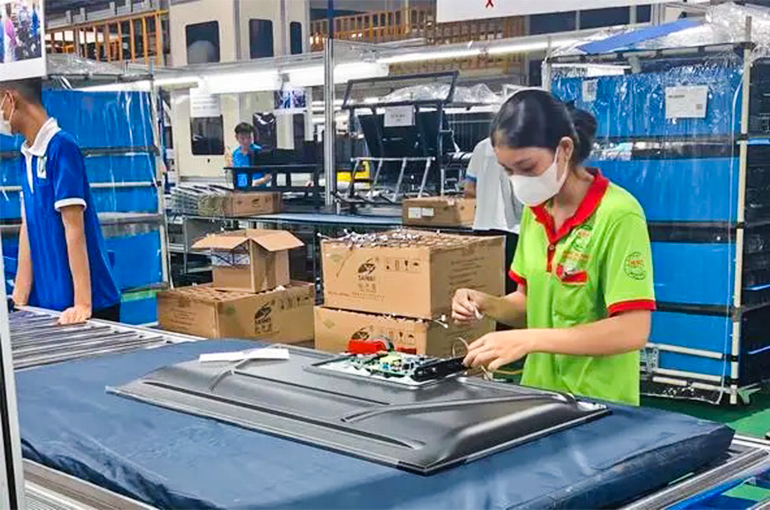 Chinese TV Parts Makers Are Following TV Manufacturers to Vietnam
Chinese TV Parts Makers Are Following TV Manufacturers to Vietnam(Yicai) Aug. 7 -- Many companies along China’s television supply chain are shifting production to Vietnam now that several leading TV manufacturers have opened factories in the southeast Asian country to use it as a springboard to export to the European and American markets.
A number of suppliers have followed TV manufacturers to Vietnam in recent years, Xu Linjun, general manager of TCL Technology Group’s Binh Duong factory, told Yicai. This has helped lower his plants’ costs by 70 percent from when it first started operating and procurement costs by 20 percent.
TCL has had a manufacturing presence in Vietnam since 1999. After the emergence of trade frictions with the US, the Huizhou-based company built a new factory in 2019 whose primary purpose was to take over production from Chinese factories and supply the US market. Its output soon more than doubled to 6 million units a year from the planned 2.5 million.
TCL ships between 1,200 and 2,000 containers of display panels from Shenzhen to Vietnam each month. These are then transported by land to its factory in Binh Duong, and finally 90 percent of the finished TV sets are shipped to North America.
TVs shipped from Vietnam to the US have a tariff of 3.9 percent, while tariffs on TVs shipped directly from China to the US are as high as 11.4 percent. This is one of the main factors driving companies to relocate.
Labor is also cheaper in Vietnam and the workforce is younger and more energetic. The monthly salary of an ordinary factory worker is around 70 percent less than in China at between CNY2,500 (USD348) and CNY3,000. The Binh Duong factory employs around 2,000 people with an average age of 25.
Global Hub
As a result, Vietnam is quickly becoming a global hub for the TV industry. Manufacturers such as China’s BOE Technology Group as well as South Korea’s Samsung Group and Hisense Group have all set up factories in the Southeast Asian country. Around 40 to 60 million TV sets are produced in Vietnam each year and this could account for between 17 percent and 26 percent of worldwide production in the future.
"The Chinese market is growing slowly, and companies need to look for opportunities in other countries," said TCL founder and Chairman Li Dongsheng. Globalization has undergone significant changes in the past few years and supply chains have become more regional and localized, which creates barriers to global trade and investment, he added.
“We need to adjust the supply chain for the US market to adapt to changes in the trade environment,” Li said. Next year, the Free Trade Agreement between the EU and Southeast Asia will come into effect. Products that meet the rules of origin standards can enter the EU duty-free. It means that exports from Vietnam may expand in the future.
Pros and Cons
“Vietnam has good relations with major global trading blocs, which makes it easier for people with Vietnamese passports to obtain visas and travel abroad,” a worker in the manufacturing industry told Yicai.
Vietnam's ecosystem is also very important, industry insiders said. Although 60 percent of raw materials may be imported from China, Vietnam's electronics supply chain is much more developed compared to other regions in Southeast Asia. Vietnam is also geographically close to China, making logistics convenient.
But there are hurdles as well. Wages and rents are rising and there are cultural differences and variations in perception that companies need to be mindful of, said a manager who has worked in the Southeast Asian country for 10 years. Also, the country’s infrastructure, electricity supply and available Science, Technology, Engineering and Mathematics talent need improvement. A relatively safe approach for companies in the supply chain to enter Vietnam is to tag along with multinational enterprises.
Vietnam's limited available land and small population may constrain the future development of industrial clusters, the manager said. Vietnam appears to be more of an extension of China's manufacturing industry rather than an outright shift.
Editor: Kim Taylor